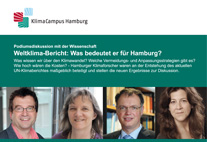KlimaCampus Hamburg: Panel Discussion on the Latest Assessment Report
28 April 2014, by Caroline Kieke

Photo: UHH/CEN
Since mid-April, the third and last part of the latest Assessment Report has been available to the public. Seven researchers of Hamburg were intensively involved in ...
Since mid-April, the third and last part of the latest Assessment Report has been available to the public. Seven researchers of Hamburg were intensively involved in all three parts – being leading authors of international working groups. On Wednesday, three of them presented key findings from the Report. The panel discussion, which took place in Universität Hamburg’s main building, drew an audience of some 250 listeners.
Prof. Jochem Marotzke from the Max Planck Institute for Meteorology is a coordinating Lead Author in Working Group I, which focused on “The Physical Science Basis of Climate Change.” In his talk, Prof. Marotzke concentrated on the role of carbon dioxide emissions, stressing that the point in time at which greenhouses gases are released into the atmosphere is secondary. What matters is the amount. The more carbon in the form of CO2 is released, the more the average temperature rises. The global community has set the political goal of limiting global warming to a maximum of two degrees. “If we want to reach this goal, we can’t emit more than 500 billion metric tons of carbon,” Marotzke claimed. “If we can’t stick to our carbon budget, things will start to heat up.”
Dr. Daniela Jacob from the Climate Service Center at the Helmholtz-Zentrum Geesthacht presented findings from Working Group II, which examined the risks and impacts of climate change. In the group, Dr. Jacob served as a bridge-builder of sorts: “As a meteorologist, I would have normally belonged in Working Group I. But here I had the opportunity to support intensive communication between the natural scientists in Group I and researchers from disciplines such as climate impact research, economics and adaptation, which are represented by Group II,” explained Jacob. She also pointed out that climate protection can produce unexpected positive side-effects. For example, when emissions from the transport of goods and from the energy sector are reduced, it is not only better for human health, but is also better economically.
The physicist and economist Prof. Hermann Held spoke as one of the Lead Authors from Working Group III, which focused on “Mitigating Climate Change.” Prof. Held is also Chair of the “Research Unit Sustainability and Global Change” at Universität Hamburg’s Center for Earth System Research and Sustainability (CEN). The scientists in his group examined questions such as the extent to which economic growth and climate protection can be reconciled. Or in other words: How much do measures that slow climate change cost? According to Held, for the first time science – on the basis of one thousand different future projections – can now actually provide a concrete number. If the global community made the two-degree goal its priority, economic growth would drop by 0.06 percent per year. That number is based on the researchers’ projections for base annual economic growth of between 1.6 and 3 percent. If we take into account the risks that climate change poses for humanity, Held argued, the amount of economic growth lost can be seen as the price we pay for a global insurance policy.
Prof. Anita Engels, Deputy Spokesperson of the Cluster of Excellence CliSAP and a sociologist working at the Center for Earth System Research and Sustainability (CEN), moderated the discussion. The event was organized by the KlimaCampus Hamburg network with its partners the Federal Waterways Engineering and Research Institute, Federal Maritime and Hydrographic Agency, German Weather Service, German Climate Computing Center, HafenCity University, Hamburgisches WeltWirtschaftsInstitut, Helmholtz-Zentrum Geesthacht (Institute of Coastal Research and Climate Service Center), Max Planck Institute for Meteorology, TU Hamburg-Harburg, Universität Hamburg, the city of Hamburg’s Office of Urban Planning and the Environment and city’s Office of Science and Technology.
More information:
Poster
Prof. Hermann Held: "Climate protection and economic growth can go hand in hand" (Interview)
